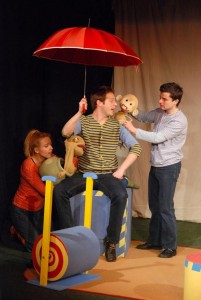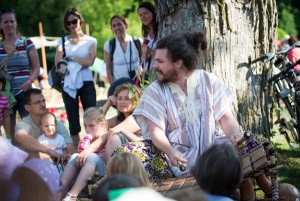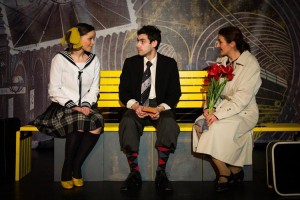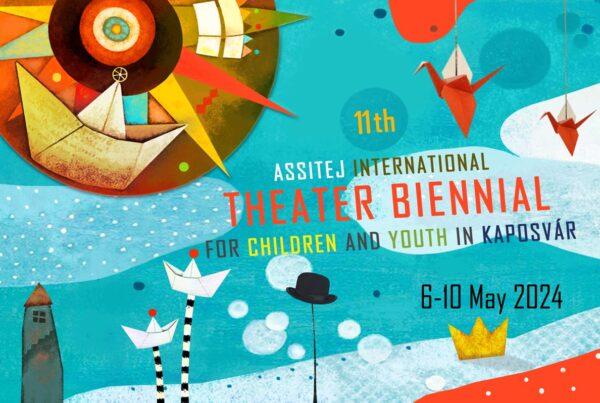Since 2009, the Kabóca Puppet Theatre of Veszprém, Hungary, has had an ongoing foreign language education program for children of all ages. English language stands as the focus of the project, but in case there is growing need, we are open to including other languages, as well.
ongoing foreign language education program for children of all ages. English language stands as the focus of the project, but in case there is growing need, we are open to including other languages, as well.
As the first element of our program, we introduced a project called Let’s Play, which was a carefully planned educational program where puppetry was used in English language teaching. Our basic concept was that the performance of the actors, the puppets and the storyline can be understood without the in-depth knowledge of a foreign language – when the plot is not too complex, of course. We presented well-known situations on stage, like introductions, greetings, etc., where children could understand the actions well before the spoken words. Comprehension always comes first – and only then are we able to articulate and communicate foreign words and sentences. Still, there is another difficulty that we have to face: it is very common that we are afraid of being laughed at when not using these expressions correctly. Luckily, we realized that puppetry helps to motivate children, to grab their attention, to develop their sense of empathy, and their awakened need for self-expression can be easily used to motivate them to communicate in a foreign language, to leave the “silent stage.” In this project we worked together with several groups of children and their teachers for more than a year, and after each short puppet scene, there were post-show talks and language-focused lessons. The program was a great success but finally it came to an end. And while all participants were satisfied, we felt that somewhere on the way – or on the road – we used puppetry only for educational functions – so we had to find theatricality again.
So, after many years and much thought, we produced a new show, called On the Road, in February, 2014. The performance is presented in English, which is not the native language of any of the actors, but really it could be played in any language. The show reveals a situation familiar to everyone who has ever learned a foreign language or just traveled abroad: our characters are trying to get around at a train station. The exact time and place is never given, but from the costumes, the music and the scenery it is clear that we are in the past and in Great Britain. The characters try to communicate with fellow passengers, understand the announcements of the witty PA system, or they just try to sit on a bench and wait. They have different means of communication because not all of them speak fluent English, or if they do, it is still hard to start using what we all learn in schools, isn’t it? Soon they realize that their common language is animation, and they tell each other stories with the help of the objects found within their suitcases. Animation – as the basic form of puppetry – is a simple and understandable tool to tell stories, and our special story is simple, universal and can be easily taken in by everyone. After many years of experimentation, we believe that people have to use similar associative procedures when watching a puppet show and speaking a foreign language. Our goal is to make a strong connection between the two, so that children, or even adults, can have a special experience in which they can use their knowledge in a very creative way. Our new goal differed from earlier – now we wanted children to see the different levels of speaking a foreign language, to show them different levels of understanding. It is a full and complex story, not just language-orientated basic situations. They can experience through the protagonists what it feels like to finally utter a long-awaited sentence. It is an unusual and unique performance, and we hope that it can be the beginning of an international project.
Our latest English language project is based on our American guest performer, Danny Bain, who created and performs the shows: The Children in the Tree and The Gingerbread Man. Danny (USA) has lived in Hungary since 2010, and studied and performed music all over the world. In his show, he tells various folktales from around the world while accompanying himself on a traditional African xylophone. The performances are interactive, including traditional and original rhythms and melodies, short songs, and a lot of participation by the children (and adults). His stories are in both English and Hungarian, and he has developed workshops for language and musical education related to these performances. For example, through one of the workshops, titled Walking in the Jungle, the children learn about animals and their sounds, which are expressed through various percussion instruments. The instruments add another level to the activity, and besides learning English, the children discover new instruments and develop their musical knowledge. Moreover, the instruments simply provide a more entertaining, hands-on, and memorable experience. Danny’s first children’s book was published in 2015.
This system can work not just in English but in any foreign language. We believe that nowadays we live in such a linguistically complex world that it is a social expectation to speak more than one foreign language – let us just think of the children of the people who migrated to foreign countries, or those traditionally bilingual nations. In Hungary this knowledge is crucial regarding the fact that our native language is very isolated and it is only spoken by a maximum of 15 million people over the world. So this whole idea can be very exciting for an international platform, and we are still open for international partners.







